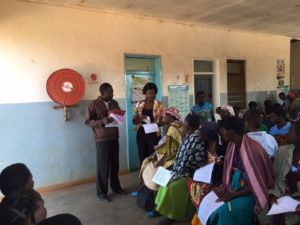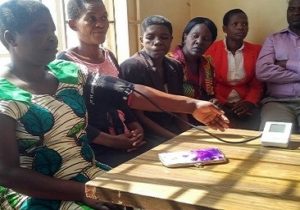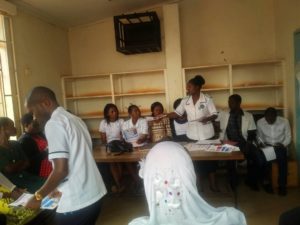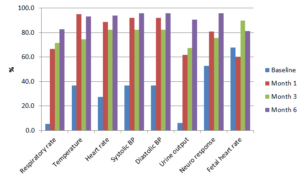Parent and Child Health Initiative and the University of Birmingham has implemented the Evaluation of Maternal Sepsis FAST-M (Fluids, Antibiotics, Source control, Transport and Monitoring) Bundle feasibility study in Dowa and Lilongwe districts of Malawi with a huge success. The research which has been implemented at Dowa District Hospital, Chankhungu Health Centre, Msakambewa Health Centre, Mwangala Health Centre, Mponela Rural Hospital, Kabudula Community Hospital, Ukwe Health Centre, Nkhongoni Health Centre, Nsaru Health Centre, Malembo Health Centre, Mitundu Community Hospital, Chiwoza Health Centre, Chadza Health Centre, Katchale Health Centre and Dickson Health Centre has shown improved results in early recognition of maternal infection and sepsis resulting into prompt treatment of cases thereby preventing maternal deaths due to sepsis in the country.
Antenatal mothers await treatment from Health Care workers at Kabudula Community Hospital
Maternal sepsis is the 3rd most common cause of maternal death worldwide. In Malawi, it accounts as the 2nd most common cause of maternal deaths. In line with SDG 3, addressing the causes of maternal deaths is an international priority. The FAST-M study has been investigating the result of staff training in vital signs monitoring using a Modified Early Obstetric Warning (MEOWS) Chart and Out-patient stickers, diagnosis of sepsis using tailored decision tool for the low-income setting, and treating sepsis using a tailored treatment tool.
Staff training sessions on use of the MEOWS charts, Decision tools, and FAST-M treatment Bundle were conducted with over 300 Health Care Practitioners playing a role in obstetrics trained. Over 200 Hospital and Patient attendants were equally trained on the use of MEOWS charts and Outpatient Stickers in the selected health facilities. In most health facilities, it was noticed Hospital Attendants and Patient Attendants have been taking a role in vital signs checking before mothers meet health care workers, it was equally important to have them oriented to the charts for their knowledge of danger signs.
Staff training programme in Mitundu on early recognition of maternal infection/sepsis using MEOWS charts and outpatient stickers
During the implementation of the FAST-M study, health care workers made a lot of changes to their system to prevent maternal infections and sepsis in the maternal wards. Mitundu Community Hospital is one facility that had high rates of maternal infections/sepsis. With the introduction of the study, Mitundu Health care workers discussed on how best to manage the maternity department, which resulted to shifting gynecological mothers to female ward to prevent cross transfer of infections in the crowded post-natal ward.
The maternity department Nurse In-charge supported by FAST-M champions shares progress notes with maternity department staff and administration on use of FAST-M tools in the maternity department
The District Health Officer (DHO) of Dowa recommended the study, “ This study has proven that with the use of FAST-M tools, it is possible to recognize, diagnose and treat maternal infection/sepsis from health centre level to district level. With the use of the tools, early recognition which leads to early management of infection/sepsis in mothers is one of the methods that low-income countries would adopt to promote improvement of care and therefore reduce maternal mortality as a result of maternal sepsis.”
One of the graphs illustrating percentage of mothers assessed with FAST-M tools while admitted in the hospital showing improved results through the dashboard




